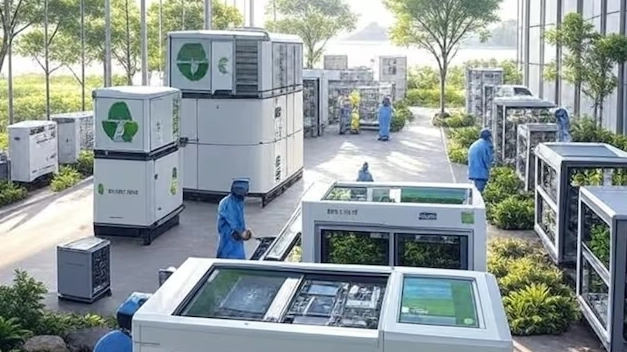
The Delhi government has decided to build India’s first E-Waste Eco Park at Holambi Kalan, which will process 51,000 metric tonnes of e-waste annually to recover critical and rare earth materials in a scientific and environmentally safe manner.
Spread across 11.4 acres, the park will be a major step towards sustainable development and circular economy. The park will process e-waste from 106 categories notified under the E-Waste Management Rules 2022.
In a statement, the Delhi Government on Monday said the E-Waste Eco Park will be backed by a Rs 150 crore investment and will generate Rs 350 crore in revenue, apart from creating thousands of jobs.
Speaking to News18, a Delhi government official said that this will help in positioning Delhi as a national leader in responsible e-waste management and green industrial innovation.
The government will issue a global tender for the park. Delhi State Industrial and Infrastructure Development Corporation (DSIIDC) will invite the world’s best green technology partners to build this benchmark project, the government said.
The project will be developed under a Design, Build, Finance, Operate and Transfer (DBFOT) model, on a Public-Private Partnership (PPP) basis, with a 15-year concession period. Once the tender is final, the project will be ready in 18 months.
When fully operational, the Eco Park is projected to process up to 25% of Delhi’s total e-waste annually within the next five years.
The park will transform Delhi into a model of circular economy and green jobs, Delhi Environment and Industries Minister Manjinder Singh Sirsa said.
“The era of irresponsible dumping is over… This park is about making Delhi future-ready — industrially, environmentally, and socially," he said, adding that by bringing informal recyclers into the formal system, the government is not just improving their livelihoods but also making the entire ecosystem cleaner, safer, and technologically competent.
The Project
The plan is not only for e-waste recycling, but the Eco Park will feature dedicated zones for dismantling, refurbishing, component testing, plastic recovery, and a second-hand electronics market.
It will also house skilling and training centres to formally upskill thousands of informal workers engaged in unregulated and hazardous e-waste handling.
The DSIIDC, as the nodal agency, will ensure that the park acts as a one-stop hub for manufacturers, refurbishers, and recyclers, enabling the safe recovery of key metals and materials, encouraging reuse, and reducing reliance on virgin resources.
One project, Many Solutions
The e-waste park will create thousands of green jobs, formalise the informal sector, and reduce Delhi’s e-waste pollution load by empowering recyclers, dismantlers, and refurbishers.
“This is not just a facility — it is a commitment to the future. The E-Waste Eco Park symbolises Delhi’s transition into a circular economy where no resource is wasted, and no worker is left behind. Through this, we are not just managing waste; we are building a future-ready city powered by innovation, employment, and sustainable industry," Sirsa said.
It is important to note that India is the world’s third-largest e-waste generator, producing over 1.6 million metric tons annually, with a growth rate of 23 per cent per annum.
As per the official records, Delhi alone accounts for nearly 9.5% of this e-waste.
The data from the Delhi government also claimed that globally, only 17.4% of e-waste is recycled, resulting in a loss of nearly $57 billion worth of valuable and critical metals such as copper, lithium, and rare earth elements.